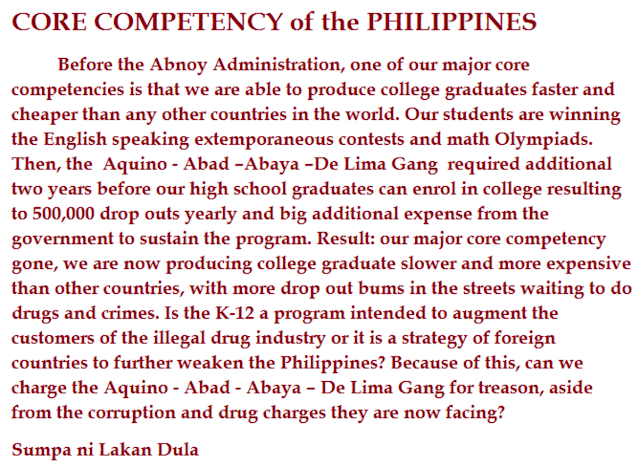What Is Wrong with Philippine Education
There is nothing inherently wrong in the additional years of DepEd's K to 12. What is harmful is its ill-conceived solutions to the problems education in the Philippines is facing. DepEd's K to 12 fails to recognize that the major problems lie in the early years and in higher education. Thus, it wrongly focuses on the latter years of high school, completely missing the roots of the problem, college and the elementary years. The impact of DepEd's K to 12 on learning outcomes in higher education, of course, still remains to be seen since the senior years in high school just started this year. Understanding the problem is key to solving the problem so it is really disconcerting to see a professor in the Philippines sharing a statement on social media that DepEd's K to 12 has harmed higher education.
Higher education in the Philippines is indeed facing a crisis, as shown by Jobers Bersales in the Cebu Daily News. This crisis, however, has been present long before DepEd's K to 12. And as noted by Bersales, this crisis can be easily seen in the data concerning higher education. First, the Philippines has so many schools offering college education.
Quantity obviously does not mean quality. One can contrast this against the number of scientists:
Higher education in the Philippines is indeed facing a crisis, as shown by Jobers Bersales in the Cebu Daily News. This crisis, however, has been present long before DepEd's K to 12. And as noted by Bersales, this crisis can be easily seen in the data concerning higher education. First, the Philippines has so many schools offering college education.
Number of Higher Education Institutions per Million People
Number of Scientists per Million People
While the Philippines leads the region in the number of colleges, it lags miserably in the number of scientists. One therefore wonders who are teaching in these numerous institutions of higher learning in the Philippines. Higher education means exploring the frontiers of human knowledge. This can be measured by the number of research articles published. In this category, the Philippines likewise falls last:
Number of Research Articles Published (2005-2014)
These numbers do reveal the quality of higher education in the Philippines. Unfortunately, the dire situation of college education in the Philippines, if not often ignored, is grossly misunderstood. Adriano Arcelo, in a UNESCO report, writes the following:
If the previous Aquino administration is to be blamed for the continuing dire situation of higher education in the Philippines, the blame must be correctly framed. The Philippines cannot address the problems with basic education without addressing first the dismal state of college education. Colleges produce the teachers in elementary and high schools. In this regard, what therefore deserves to be blamed is the inaction to lift the quality of college education, not DepEd's K to 12. In fact, in quite an insidious manner, with DepEd's K to 12 dramatically reducing college enrollment for the next two years, the government may actually be trying to close a number of these supposedly higher learning institutions.





Comments
Post a Comment